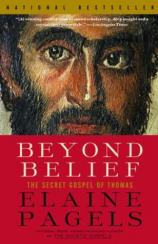Reading Group Guide
Discussion Questions
Beyond Belief: The Secret Gospel of Thomas

1. Why has Elaine Pagels chosen Beyond Belief as her title? How can the title be interpreted?
2. Pagels begins each chapter with a personal reflection. What do these passages add to the book? What do they reveal about Pagels's own struggles with some aspects of traditional Christian beliefs? For what is she searching, as both a scholar and a Christian?
3. Pagels argues that those who "enshrined the Gospel of John within the New Testament and denounced Thomas's Gospel as 'heresy' decisively shaped --- and inevitably limited --- what would become Western Christianity" [p. 29]. In what ways has the triumph of John over Thomas shaped and limited Western Christianity? How might Christianity be different today if Thomas had been included in the New Testament?
4. Pagels says, "Thomas's Gospel encourages the hearer not so much to believe in Jesus, as John requires, as to seek to know God through one's own, divinely given capacity, since all are created in the image of God" [p. 34]. Why is this distinction so important? Why were Thomas's ideas considered heretical?
5. Why did Irenaeus and other early Christian theologians feel it was essential to unify Christian beliefs into a canon of orthodox teachings that all Christians must accept? What political pressures influenced their decisions?
6. What are the dangers of spiritual intuitions, visions, divine revelations, and other intensely subjective religious experiences? What are some of their destructive consequences? What positive value is there in such experiences? Should the Church encourage or discourage Christians from seeking or relying on these methods of access to a direct knowledge of God?
7. How do the Nag Hammadi texts alter our view of early Christianity? Do they, as Pagels suggests, offer a more open, diverse, and less doctrinal version of Christianity? Can they coexist with canonical texts? Should they be embraced by Christians? Why were they suppressed?
8. In the Gospel of Thomas, Jesus tells his disciples, when they ask about the resurrection, "What you look forward to has already come, but you do not recognize it," and says that "the kingdom of the Father is spread out upon the earth, and people do not see it" [p. 50]. What are the implications of these statements? How do they differ from more traditional ideas of the resurrection and the kingdom of God?
9. Pagels discusses several highly symbolic or metaphorical readings of the Bible, such as The Secret Book of John, in which Eve is interpreted as an embodiment of "epinoia --- a 'creative' or 'inventive' consciousness," and the apple as a symbol of higher spiritual knowledge [pp. 164–67]. How convincing is this reading? What does it offer that more conventional readings do not? Why did Irenaeus want to prohibit such interpretations?
10. At the beginning of Chapter 5, Pagels asks herself "Why not just leave Christianity --- and religion --- behind, as so many others have done?" [p. 143] Why is she tempted to abandon the church? What is it about Christianity that she still finds compelling? Does her situation seem representative of the ambivalence that many Christians feel today?
11. Based on your reading of Beyond Belief, how should religious tradition and innovation be balanced? How can the Church maintain its traditions without suppressing the imaginative involvement of creative individuals?
12. Pagels ends by saying that "the wealth and diversity of our religious traditions" encourages "those who endeavor, in Jesus' words, to 'seek, and you shall find'" [p. 185]. Why does she end her book in this way? What aspect of Christianity is she underscoring?
Beyond Belief: The Secret Gospel of Thomas
- Publication Date: May 4, 2004
- Paperback: 272 pages
- Publisher: Vintage
- ISBN-10: 0375703160
- ISBN-13: 9780375703164







